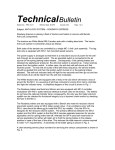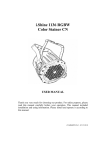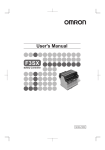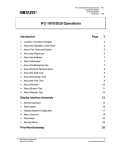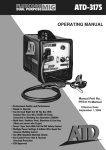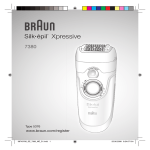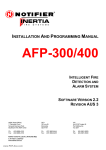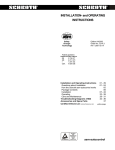Download 1010/2020 Operators Manual
Transcript
OPERATORS MANUAL 1010 2020 INTELLIGENT FIRE DETECTION AND ALARM SYSTEM SOFTWARE VERSION 3.0 REVISION AUS1 NSW (Head Office) 7 Columbia Court Norwest Business Park Baulkham Hills NSW 2153 QLD 16 Lucy St Moorooka Qld 4104 VIC Unit 2 297 Ingles St Port Melbourne Vic 3207 Ph: Fax: Ph: Fax: Ph: Fax: (02) 9899-4155 (02) 9899-4156 Notifier Inertia Pty Ltd (A.C.N 002 692 962) A PITTWAY COMPANY www.inertia.com.au (07) 3892-6444 (07) 3892-6455 (03) 9681-9929 (03) 9681-9930 PAGE 2 1010/2020 OPERATORS MANUAL TABLE OF CONTENTS TABLE OF CONTENTS.......................................................................................................................................2 BASIC OPERATIONAL PROCEDURES.............................................................................................................3 TO ACKNOWLEDGE (SILENCE) ALARMS: .................................................................................................................................................. 3 TO SILENCE THE EXTERNAL BELL............................................................................................................................................................ 3 TO ACKNOWLEDGE FAULTS ..................................................................................................................................................................... 3 TO ISOLATE A DEVICE CURRENTLY IN ALARM........................................................................................................................................... 3 TO RESET THE PANEL ............................................................................................................................................................................. 3 TO RESET THE AIR CONDITIONING ........................................................................................................................................................... 3 TO ISOLATE A DETECTOR OR MODULE .................................................................................................................................................... 4 TO DE-ISOLATE A DETECTOR OR MODULE ............................................................................................................................................... 4 THE KEYBOARD:................................................................................................................................................5 SYSTEM OVERVIEW ..........................................................................................................................................6 ABOUT PASSWORDS ............................................................................................................................................................................... 6 USING THE ALPHANUMERIC KEYBOARD ......................................................................................................6 LCD DISPLAYS EXPLAINED..............................................................................................................................7 ALL SYSTEMS NORMAL DISPLAY .............................................................................................................................................................. 7 ALARM DISPLAY ..................................................................................................................................................................................... 7 FAULT DISPLAY ...................................................................................................................................................................................... 7 ISOLATE DISPLAY .................................................................................................................................................................................... 7 OPERATING THE PANEL...................................................................................................................................8 ACKNOWLEDGING ................................................................................................................................................................................... 8 SCROLLING............................................................................................................................................................................................. 8 DISPLAYING CURRENT ALARMS AND FAULTS ............................................................................................................................................ 8 RESETTING ............................................................................................................................................................................................. 8 BELL ISOLATE......................................................................................................................................................................................... 8 OPERATING ANNUNCIATORS:.........................................................................................................................9 SCS-8 SMOKE CONTROLLER................................................................................................................................................................... 9 ACM-16AT ............................................................................................................................................................................................ 9 ACM-32R .............................................................................................................................................................................................. 9 LCD-80 ................................................................................................................................................................................................. 9 READ STATUS MENU ........................................................................................................................................10 SYSTEM STATUS:.................................................................................................................................................................................... 10 POINT READ ........................................................................................................................................................................................... 10 ALARM LIST ............................................................................................................................................................................................ 10 FAULT LIST............................................................................................................................................................................................. 10 ISOLATED DEVICE LIST ............................................................................................................................................................................ 10 MONITOR ON: ......................................................................................................................................................................................... 10 CONTROL ON: ........................................................................................................................................................................................ 10 POINT READ, SCREEN DISPLAY ............................................................................................................................................................... 10 ALTER STATUS MENU.......................................................................................................................................11 ISOLATE FUNCTION: ................................................................................................................................................................................ 11 CONTROL MODULE ACTIVATE/DEACTIVATE: ............................................................................................................................................. 11 DETECTOR SENSITIVITY:.......................................................................................................................................................................... 11 TIME CHANGE:........................................................................................................................................................................................ 11 SYSTEM DIAGNOSTICS: ........................................................................................................................................................................... 11 WALK TEST: ........................................................................................................................................................................................... 11 SYSTEM TEST MENU .........................................................................................................................................12 ALARM TEST: ......................................................................................................................................................................................... 12 FAULT TEST: .......................................................................................................................................................................................... 12 LAMP TEST:............................................................................................................................................................................................ 12 SYSTEM: ................................................................................................................................................................................................ 12 PERIODIC TEST ..................................................................................................................................................12 SYSTEM HISTORY EVENT LOG ........................................................................................................................13 PRINTING REPORTS ................................................................................................................................................................................. 13 EXTRACTING THE HISTORY LOG............................................................................................................................................................... 13 TO CLEAR THE HISTORY LOG: ................................................................................................................................................................. 14 TO ENABLE/DISABLE THE HISTORY LOG: ................................................................................................................................................. 14 HOW TO SET THE DATE AND TIME: ................................................................................................................15 COPYRIGHT © 2000, NOTIFIER INERTIA PTY LTD 1010/2020 OPERATORS MANUAL PAGE 3 BASIC OPERATIONAL PROCEDURES TO ACKNOWLEDGE (SILENCE) ALARMS: Press ACK NEXT To individually acknowledge alarms. The fire alarm LED will go steady and the buzzer will silence once alarms have been acknowledged. TO SILENCE THE EXTERNAL BELL Press EXT BELL ISOL To isolate (silence) the external bells. The yellow LED labeled "EXT BELL ISOLATED" will illuminate to confirm. To de-isolate the bells simply press the button a second time. TO ACKNOWLEDGE FAULTS Press ACK NEXT Once, to acknowledge all faults in the system. The common fault LED will go steady. Subsequent faults will require further acknowledgment TO ISOLATE A DEVICE CURRENTLY IN ALARM Press ACK NEXT Press ISOL To scroll through alarms until the alarm you wish to isolate is on the display. The device is now isolated. TO RESET THE PANEL Press SYSTEM RESET Once. The LCD will read "System Reset Initiated". This process may take up to 30 seconds. NB: All alarms and faults must be acknowledged before a system reset is allowed. TO RESET THE AIR CONDITIONING LATCHING SYSTEMS Press SYSTEM RESET Once. While the system is performing it's reset, locate the SCS-8 fan control module and press the button labeled "A/C TRIP RESET". NON-LATCHING SYSTEMS Press SYSTEM RESET Once. The air conditioning trip output will automatically reset. COPYRIGHT © 2000, NOTIFIER INERTIA PTY LTD PAGE 4 1010/2020 OPERATORS MANUAL BASIC OPERATIONAL PROCEDURES (CONT) TO ISOLATE A DETECTOR OR MODULE EG: Loop 1 Detector 26 Press Enter* ALTER STATUS > L1D26 1 > ENTER Press ENTER The LCD will then ask, "Do you want this point isolated? [Y = YES N = NO] " Enter* Y Press ENTER If you’re doing only 1 isolate press ß BACK SPACE To exit, otherwise continue with next device. TO DE-ISOLATE A DETECTOR OR MODULE It is strongly recommended before you de-isolate that you first check to see if the detector/module you are about to de-isolate is currently in alarm by doing a read status on the point. (See Page 10) Follow the same procedure as Isolating above, except answer when the LCD asks, " Do you want this point isolated? [Y = YES N = NO]" Enter* N Press ENTER If your doing only one isolate press ß BACK SPACE To exit, otherwise continue with next device. CAUTION: The above serves only as a quick reference guide. This system should only be operated by qualified professionals. Incorrect operation may result in the systems becoming inoperable. Always notify your service company before making any attempt to operate the system. * Please refer to Page 6 for details of how to enter alphanumeric data. COPYRIGHT © 2000, NOTIFIER INERTIA PTY LTD 1010/2020 OPERATORS MANUAL PAGE 5 THE KEYBOARD: COPYRIGHT © 2000, NOTIFIER INERTIA PTY LTD PAGE 6 1010/2020 OPERATORS MANUAL SYSTEM OVERVIEW The Notifier/Inertia fire systems 1010/2020 intelligent fire detection and alarm system is a microprocessor based system used for the detection and warning of fire alarm conditions for commercial, residential and industrial buildings. Unlike conventional fire control panels, the 1010/2020 intelligently communicates with each detector and Input/Output module on the entire system. Thus providing accurate information as to the exact point of alarm and the ability to operate specific outputs using programmable logic functions. The method of communication with field devices is a high speed proprietary protocol capable of supporting up to 99 detectors and 99 modules per two wire loop. The 1010 panel is capable of 4 loops and the 2020 is capable of 10 loops. Each or these panels may then be networked together on our customised network protocol known as Notifier-Net which provides peer to peer or master slave networking allowing may thousands of detectors and Input/Output (I/O) points to be monitored and controlled. The system can also be connected into our proprietary Network Control Station (NCS) which is a windows based graphical control centre for controlling the entire fire alarm network. Each of the panels can also accommodate up to 32 Annunciator cards, each can provide 32 x fully programmable LED indications, 16 x single pushbutton isolate functions, 8 x AS1668 fire fan control modules, 8 x relay outputs, remote LCD displays etc . These will be discussed later in the manual. These systems due to their immense flexibility require a firm understanding of the total operation of the system for their correct operation. Please ensure that the following document is read in its entirety before making any attempt to operate the system. ABOUT PASSWORDS As the program in the system is critical to the correct operation during fire alarm conditions, it is protected from modification by a five digit password. All other features are available without password protection. Please ensure the password is recorded and stored in a safe place as it remains unique and your key to future system modification. USING THE ALPHANUMERIC KEYBOARD As the system requires alphanumeric entry, each key on the main keypad is designed to serve multiple purposes. For instance, pressing the "3" key when in data entry mode will display the letter 3 on the LCD, pressing it a second time will display the letter "D" and so on. The alphabet letter(s) relating to each key is printed directly above the corresponding numerical key. By pressing a different key you will automatically accept your previous letter and move on. If two of the characters contained on a particular key (for instance, the letter D and the number 3) are need to be entered in succession, then press the "NEXT CHAR” key to accept the current letter and move on. For example E.g.: To enter L1D34 (loop 1 detector 34) Keystrokes EXT BELL ISOL Result EXT BELL ISOL L 1 1 3 3 D NEXT CHAR 3 3 4 COPYRIGHT © 2000, NOTIFIER INERTIA PTY LTD 4 1010/2020 OPERATORS MANUAL PAGE 7 LCD DISPLAYS EXPLAINED ALL SYSTEMS NORMAL DISPLAY When the system is in normal mode (ie: No faults, alarms or isolates) it will display the "ALL SYSTEMS NORMAL" message. The insert “building name here” is a 20 character area, which can be customised. INSERT BUILDING NAME HERE ALL SYSTEMS NORMAL 13:20 ALARM DISPLAY ALARM: ACKALM: PHOT: ION: THER: CMBO: MON: SUPV: Unacknowledged Alarm Acknowledged alarm. Alarm # of total alarms 31/12/00 Photo-Optical Detector IONISATION DETECTOR Thermal Detector Combination Heat, Smoke, and Ion Detector Monitor input (ie: Break glass, pressure switch) Supervisory Device Descriptor ALARM: 01OF06 Z010 LEVEL 2 WEST Zone # and Descriptor PHOT APPARTMENT 212 A=06 F=00 I=00 Alarm Fault & Isolate Counters 499 Loop # Device# FAULT DISPLAY FAULT: ACKFLT: Unacknowledged Fault Acknowledged Fault FAULT SMOKE(PHOTO) Z010 INVALID REPLY APPARTMENT 212 A=00 F=01 I=00 499 ISOLATE DISPLAY ISOLAT: ISOALM: Isolated device Isolated device, which is also in Alarm ISOLAT SMOKE(PHOTO) Z010 ISOLATED DEVICE APPARTMENT 212 A=00 F=00 I=01 499 COPYRIGHT © 2000, NOTIFIER INERTIA PTY LTD PAGE 8 1010/2020 OPERATORS MANUAL OPERATING THE PANEL ACKNOWLEDGING Each and every alarm event that takes place on the system is required to be individually Acknowledged. This acknowledgment process confirms to the system that an operator is aware of the situation and as such the internal buzzers no longer require sounding. Any subsequent alarm will re-activate the internal buzzer and require re-acknowledgment. When multiple faults come into the system simultaneously due to broken cables, missing devices, system faults etc. only one acknowledge function is required. This acknowledgment performs a “block acknowledge” of all faults in the system. A monitor device or detector which is set as tracking (Non-Latching) will also require acknowledgment when it clears it's alarm state. All events on the system must be acknowledged before a system reset can be performed. SCROLLING As the LCD is only 2 lines, to scroll from one event to the next, simply press the "ACK NEXT" key. DISPLAYING CURRENT ALARMS AND FAULTS Once all alarms and faults have been acknowledged, the system maintains a list of all current alarms and faults in the system which can be scrolled through individually, This can be done by simply pressing "ACK NEXT" to step through the list. The list priority is Alarms in chronological order, then Faults & Isolates in Loop #, Device # order. Continual scrolling will wrap around back to the beginning. Once a new alarm occurs, the scrolling process is cleared and the cursor position is set back to the first event (alarm) in the list. RESETTING As alarms on the system are generally latching, a System Reset is then required to return the panel back to its normal condition. A system reset will clear all alarms from the system, and all faults. Isolated devices however will remain isolated. To perform a system reset, press the "SYSTEM RESET" key once. BELL ISOLATE The “EXT BELL ISOL” button will isolate all outputs flagged with “Bell Isolate”. This is to prevent the main bells from ringing during routine testing. Also once an alarm has been acknowledged, you can press the “EXT BELL ISOL” button, and the bells will silence and remain silenced. Note: If automatic bell cut-off is set, once the cut-off is initiated the EXT BELL ISOL will remain isolated until a system reset. If bell cut-off is not set, the EXT BELL ISOL can be toggled on/off at any time by pressing the button. COPYRIGHT © 2000, NOTIFIER INERTIA PTY LTD 1010/2020 OPERATORS MANUAL PAGE 9 OPERATING ANNUNCIATORS: SCS-8 SMOKE CONTROLLER Each Notifier SCS-8 Smoke Control Annunciator can control up to 8 individual fans as per the requirements of AS1668. Each fan has a 3 position switch and 3 LED indications. The 3 positions on the switch are: ON = Force fan to RUN, overriding all other signals. AUTO: = Fan controlled by others but in fire mode follows programmed logic sequence. OFF: = Force fan to STOP, overriding all other signals. The 3 indicators are RUN = Airflow is detected upstream from the fan. STOP = Airflow is NOT detected upstream from the fan. FAULT = The fan is not responding to signals given. • • • If the Stop LED is flashing, this means the fan has been shut down due to smoke being detected in the supply air duct to the fan (Auto mode only). Each fan can be individually controlled in fire-mode or in normal mode. The operation of the fan in auto mode is programmed specific for each project. The A/C trip reset button on the top of the module doubles as the lamp test button when not in fire-mode. ACM-16AT The Notifier ACM-16AT 16 way pushbutton Annunciator is used for single press operation of system functions. Dependent on the configuration. Each push button also has one RED and one Amber LED. Each button can be programmed for a different function ie: Function of Button Output activate/deactivate Zone isolate/de-isolate Module isolate/de-isolate RED LED Output Activated Zone in alarm Module In Alarm AMBER LED Output In Fault Zone is isolated or in Fault Module Isolated or in Fault ACM-32R The Notifier ACM-32R Annunciator has 32 x LED indications which are fully programmable. Each LED can represent 1 x detector, module or zone and will illuminate red when in fire mode or when operated. LCD-80 The Notifier LCD-80 Mimic is a remote LCD mimic which has a 4 x 20 LCD displaying text messages as per the main system LCD. From this point you can acknowledge, scroll and reset the panel as per the main panel control. COPYRIGHT © 2000, NOTIFIER INERTIA PTY LTD PAGE 10 1010/2020 OPERATORS MANUAL READ STATUS MENU The READ STATUS menu provides the following options: Selection 1 Abbreviation SYS 2 PTREAD 3 ALM 4 FLT 5 ISO 6 MONON 7 CTLON Description SYSTEM STATUS: Provides information on currently programmed System Parameters. Refer programming manual for details. POINT READ Provides an instant "snap shot" of the current status of any device in the system, including obscuration levels, verification count, options etc. See Point Read heading below for more information ALARM LIST Provides a list of devices currently in alarm. Select to display zones or devices and then use the Previous and Next keys to scroll through the list. Press Backspace when finished. FAULT LIST Provides a list of devices currently in fault. Select to display zones or devices and then use the Previous and Next keys to scroll through the list. Press Backspace when finished. ISOLATED DEVICE LIST Provides a list of devices currently isolated. Select to display zones or devices and then use the Previous and Next keys to scroll through the list. Press Backspace when finished. MONITOR ON: Provides a list of monitors (loop inputs) currently activated. Use the Previous and Next keys to scroll through the list. Press Backspace when finished CONTROL ON: Provides a list of control modules (loop outputs) currently activated. Use the Previous and Next keys to scroll through the list. Press Backspace when finished. Note: Press "BackSpace" at any time to exit. POINT READ, SCREEN DISPLAY Once you have entered point read from the read status menu and entered LxxDxx, Zxxx then Enter , the following display wil appear. Status Type Description NORMAL SMOKE(PHOT) COMPUTER ROOM SMOKE I AF T V V000 M 034 S 2 26 Isolated Alarm Fault Tracking AVF (AVF) Sensitivity % of Alarm (Count) Silenceable (Bell Isol) Address Lxx Dxx Note A detector may be in periodic test during a read status. In this case, the detector status will be normal but the percentage of alarm threshold will be greater than 100%. If this happens, wait one minute, and then perform read status again. COPYRIGHT © 2000, NOTIFIER INERTIA PTY LTD 1010/2020 OPERATORS MANUAL PAGE 11 ALTER STATUS MENU The ALTER STATUS menu provides the following options: Selection 1 Abbreviation ISO 2 CTL 3 DSEN 4 TIME 5 DIA 6 WALK Description ISOLATE FUNCTION: Provided the ability to isolate / de-isolate individual points on the system. Enter the detector, module or zone number and then select Y to isolate or N to de-isolate. Press backspace to exit. CONTROL MODULE ACTIVATE/DEACTIVATE: This provides the ability to manually activate / de-activate any control point (CMX output) on the System. Enter the LxxMxx then select Y/N DETECTOR SENSITIVITY: Provides the ability to change each detectors sensitivity level. Sensitivity can be set to L=Low, M=Medium, H=High. TIME CHANGE: Provides the ability to change the system clock time. SYSTEM DIAGNOSTICS: Invokes a self diagnostic systems check. WALK TEST: Invokes walk test mode for 1 man detector testing. Walk test will automatically exit after 15 minutes of no alarms. Please refer to walk test heading below for further information. WALK TEST PROCEDURE: Walk test is a feature used for 1 man detector testing. Menu options are as follows: Selection 1 Abbreviation SEL 2 UNP 3 UNI 4 TEST 5 UNTST 6 EXIT Description Select Loops for Walk Test: Select the loops to perform walk test on. Unprogrammed Device Report Print a report to the printer showing a list of all unprogrammed devices on the loop (s). Uninstalled Devices Print a report to the printer showing a list of all uninstalled devices on the loop (s). Tested Device Report Print a report to the printer showing a list of all tested devices on the loop (s). Untested Device Report Print a report to the printer showing a list of all untested devices on the loop (s). Exit Walk Test Mode: It is important that walk test be correctly exited to return the system back to it’s normal condition. (The panel will automatically exit walk test mode after 15 minutes of no alarms.) The procedure for walk test is as follows. • • • • • Enter walk test mode Select one or more loops for walk testing Test detectors & input modules. Print reports Exit walk test mode returning panel to normal. COPYRIGHT © 2000, NOTIFIER INERTIA PTY LTD PAGE 12 1010/2020 OPERATORS MANUAL During a walk test, as each detector alarms it will not display on the LCD, it’s LED will activate for 5 seconds and outputs set as “Walk Test” will toggle on for 10 seconds then reset. These outputs should be connected to sounders or bells to confirm to the testing technician that the alarm has been received at the panel. The detectors will also automatically reset during walk test mode. NOTE: During walk test, all type ID’s are ignored therefore NONA and PHOD detectors will register in walk tests. Ie: If a door switch or fan airflow module etc. activates it will ring bells for 10 seconds and appear in the report. MMX-2 modules are not able to be walk tested. SYSTEM TEST MENU The System test menu allows for manual testing of devices on the system. To enter system test mode, simply press the "SYSTEM TEST" button once. The SYSTEM TEST menu provides the following options: Selection 1 Abbreviation ALM 2 FLT 3 Lamp 4 System Description ALARM TEST: This provides for a real alarm test on a detector. Enter LxxDxx then press enter. The detector must then be Acknowledged and Reset as per normal. FAULT TEST: This provides for a real fault test on a detector/ module. Enter LxxDxx or LxxMxx then enter. You will be required to acknowledge faults as per normal. LAMP TEST: Initiates a lamp test on the system. SYSTEM: Function is not used. PERIODIC TEST To ensure correct operation, the panel continually performs a series of automatic chamber tests on all intelligent detectors installed in the system. If a detector fails one of these automatic chamber tests, it will generate a Fault message eg; "DET FAILED TEST", "DRIFT COMPENSATION OUT OF TOLERANCE" etc. These messages signify either the detector may be incapable of generating an alarm or has become contaminated and may cause a false alarm. Either way it is important that your service company be contacted immediately to repair or replace the indicated device. Please note: While the fire panel carries out this test on a detector, the LED’s on the detector stop blinking for 10 seconds. COPYRIGHT © 2000, NOTIFIER INERTIA PTY LTD 1010/2020 OPERATORS MANUAL PAGE 13 SYSTEM HISTORY EVENT LOG The panel has the option to store a history buffer of the last 400 events on the system. These events can then be displayed or printed in event order or grouped in reports. If this feature has been enabled, it can be accessed as follows. To enter system history menu press the "Special Function" key once. SPL FUNCT The following screen will then appear. PRESS 1= RPT 2= HIS PRINTING REPORTS Select 1= RPT from special functions menu. The following screen will then appear. 1= SYS, 2=POINT, 3=ALM, 4=FLTS, 5=ISO, 6=MONON, 7=CTLON 1= SYS, 2= POINT, 3= ALM, 4= FLTS, 5= ISO, 6= MONON, 7= CTLON, Total system report Full device report All devices in alarm report All devices in fault report All isolated devices report All monitor modules active report All control modules active report Select desired option and then press ENTER, the screen will than ask: PRESS 1= REQUEST, 2= ABORT, The report will then be sent directly to the system printer. Note: If you do not have a system printer, a laptop computer can be used in terminal mode to receive the information. EXTRACTING THE HISTORY LOG Select 2=HIS from special functions menu. The following screen will now appear. PRESS 1=PRINT, 2=DISPLAY, 3=STEP, 4=RANGE/STATUS COPYRIGHT © 2000, NOTIFIER INERTIA PTY LTD PAGE 14 1010/2020 OPERATORS MANUAL 1= PRINT, 2= DISPLAY, 3= STEP, Print history log directly to system printer. Displays the History log on the LCD and scrolls automatically Displays the history log on the LCD and scrolls one event each time the "ENTER" button is pressed. 4= RANGE/STATUS, Displays the number of events in the system Note: If selecting items 1,2 or 3, you will be prompted to enter the first event and last event. Event 1 is the oldest and event 400 will be the most recent. TO CLEAR THE HISTORY LOG: Please note that clearing and enabling/disabling the history log requires knowledge of system password and should only be performed by the Service Company responsible for the system. Enter programming mode by pressing PROG Enter 5 digit password ***** Select 8=HIS 8 Select 3=CLEAR 3 The screen will now displayEnter Number entries to clear (1-400) Select number and press ENTER, TO ENABLE/DISABLE THE HISTORY LOG: Enter programming mode by pressing PROG Enter 5 digit password ***** Select 8=HIS 8 To Enable (Start) the history log: Select 1=START To Disable (Stop) the history log: Select 2=STOP 1 2 COPYRIGHT © 2000, NOTIFIER INERTIA PTY LTD 1010/2020 OPERATORS MANUAL PAGE 15 HOW TO SET THE DATE AND TIME: Enter Alter Status menu by pressing Select 4=TIME ALTER STATUS 4 You will then be prompted to enter the following Enter the month Enter the day of month Enter the year Enter the day-of-week Enter the hours in military time Enter the minutes Do you want daylight savings enabled? Valid Reponses (1-12) (1-31) (0-99) (1=SUN,……,7=SAT) (0-23) (0-59) (Y/N) COPYRIGHT © 2000, NOTIFIER INERTIA PTY LTD















